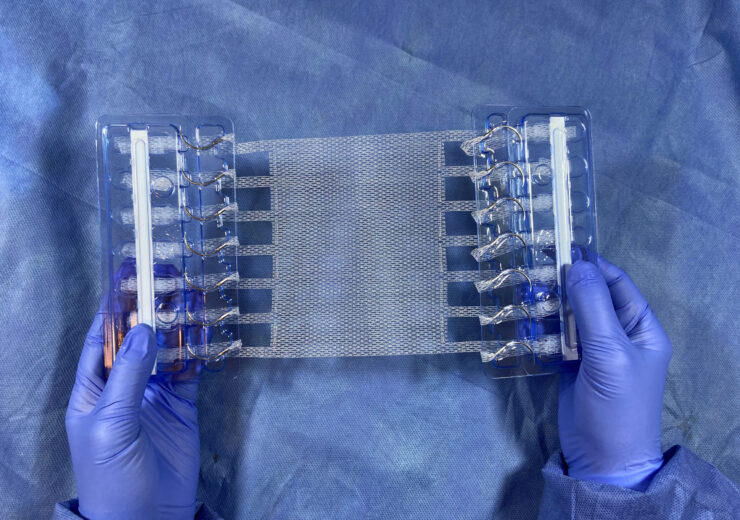The FDA approval expands the company’s T-Line Hernia Mesh indication to include the reinforcement of soft tissue where weakness exists for the repair of ventral hernias performed through sublay approach

T-Line Hernia Mesh. (Credit: PRNewswire/Deep Blue Medical Advances)
US-based medical equipment manufacturer Deep Blue Medical Advances has received the US Food and Drug Administration (FDA) 510(k) approval for its T-Line Hernia Mesh.
The company’s patented T-Line Hernia Mesh is already approved in the US for the repair of ventral hernias by reinforcing the soft tissue, through an open onlay approach.
The current FDA approval expands its indication to include sublay technique in open hernia surgery to help more patients treated with the device.
According to Deep Blue Medical, sublay procedure is the most widely performed open surgery ventral hernia repair method for large incisional hernias.
Deep Blue founder and chief medical officer Howard Levinson said: “Many hernia surgeons prefer the sublay technique for hernia repair and have been eager to use T-Line for this, so we are thrilled to receive this clearance to enable broader clinical use.”
Established in 2015, Deep Blue Medical Advances is focused on addressing the high rate of hernia recurrence and providing surgeons with a superior surgical experience.
The company designed the T-Line mesh with novel mesh extensions that provide superior anchor strength to prevent mesh fixation failure.
Its design is expected to enable surgeons to provide optimal mesh tension adjustment and other potential surgical and clinical advantages compared to conventional mesh applications.
The company is currently commercialising the T-Line Hernia Mesh and has a portfolio of additional hernia and surgical products under development.
Deep Blue Medical Advances CEO Bill Perry said: “There are 4-5 million abdominal incisions (laparotomies) performed annually in the United States with hernias resulting after approximately 25% of these procedures.
“Further, long-term ventral hernia repair failure rates are up to 32% using conventional mesh and 63% with suture repair only, creating a multibillion-dollar clinical cost to the US healthcare system.
“This expanded clinical indication allows our growing number of clinical sites to address this important problem in significantly more patients with T-Line Hernia Mesh.”
